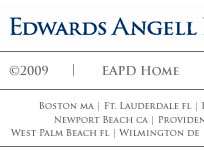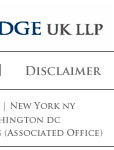
Counting the Costs - Lord Justice Jackson's Preliminary Report on Costs
In January, Lord Justice Jackson commenced a fundamental review of civil litigation costs in order to address growing concerns over the increasing expense of litigation.
Introduction
Jackson LJ was appointed by the Master of the Rolls and on 8 May 2009 he published a very thorough preliminary report of his findings, spanning just over 1,000 pages. This preliminary report was designed to form the basis for discussions during the consultation period which is currently open until 31 July 2009. Final recommendations are then expected in December 2009. As its size suggests, the preliminary report has an extremely wide ambit, with Jackson LJ exploring issues ranging from litigation funding and fixed costs to costs in personal injury claims, the level of costs involved in the process of litigation itself and even looking at the summary and detailed assessment systems to consider if they warrant reform. It is clear that the Jackson report on costs has the potential for wide ranging and major change.
Jackson LJ emphasises throughout the report that he is keeping an open mind on the issues discussed, and that he plans on making no firm decisions until the consultation period has closed. The report offers a number of tentative opinions or answers to some of the issues raised which, although labelled as provisional, give some indication of the extent and manner of the likely reform later this year. For the purposes of this article, we have confined ourselves to an examination of costs shifting; procedural changes; disclosure; and witness statements.
Cost Shifting
The general rule is that the losing party pays the winning party's cost. Jackson LJ considers whether this rule, in its current form, should remain untouched, emphasising his view that it should not be viewed as a "sacred cow" and that it should be "critically examined". He observes that there are certain areas of litigation, for example, employment tribunals and very small claims, which operate quite successfully without cost shifting.There may be an argument that access to justice would be improved if the threat of having to meet the other side's costs if one's own case fails was removed.
Jackson LJ proposes complete abolition of the rule in only very limited classes of action. For instance, in group litigation he suggests it might be more beneficial for parties to bear their own costs, for example, collective actions where individual claims are combined. In some instances Jackson LJ appears to be in favour of costs shifting in one direction only; meaning that when a defendant loses they would pay the claimant's costs but when the claimant loses each side would pay their own costs. Of course, in itself this one sided approach would seem somewhat unfair on defendants. The benefit is that it would make 'After the Event Insurance' unnecessary and so remove this cost altogether from the litigation process.
Jackson LJ points out that consideration of costs shifting leads to other areas for review, for example, whether abolishing the costs shifting rule could allow lawyers to take their fee out of the damages recovered, resulting in a contingency type arrangement which is currently not permissible under English law. If contingency fees were to be endorsed it may lead to concerns that the system could be exposed to the threat of frivolous litigation claims (an accusation levied at the US litigation system). Jackson LJ has therefore sought guidance through consultation on how a contingency fee system could be effectively regulated to prevent abuse.
Jackson LJ seeks feedback on costs shifting generally, particularly in relation to measures which might encourage earlier resolution of claims. He suggests giving the court jurisdiction to award costs based upon the conduct of parties and specifically whether reasonable efforts have been made to settle. Of course, in this instance, this does not sound so very different to the current costs rules; costs are usually awarded to the successful party, at the courts' discretion after taking into account all the circumstances of the case, which would usually include a consideration of any unreasonable rejection of ADR.
Procedural Changes
Jackson LJ also explores how to control the costs of litigation procedurally, looking at the different aspects of the civil litigation process, to see where the costs system could be made more cost efficient. The preliminary report addresses the need for more effective case management, including consideration of ADR and the cost problems associated with the pre-action protocols. There has been ongoing debate in relation to whether the front-loading nature of the pre-action protocols saves costs when settlements cannot be reached or take place at a later stage in the proceedings. Jackson LJ reiterates throughout the report that the courts must take responsibility themselves by actively managing cases more effectively and that they should exert greater control over the conduct of proceedings to regain control of costs.
Disclosure
Principally concerning himself with larger more complex cases, Jackson LJ considers there to be a number of very serious problems with the current disclosure process directly resulting in spiralling costs.
Although standard disclosure should reduce the amount of documents that are disclosed, it does not reduce the number of documents solicitors have to review. He notes that the courts are often all too willing to entertain specific disclosure applications and also that the sudden and significant growth in electronic communications can significantly increase costs. Jackson LJ sets out a number of different proposals for reform ranging from making no changes to the current system to limiting disclosure to just the documents replied upon.
E-Disclosure
Cases where some, if not all, of the documents are held electronically are increasingly the norm. The use of emails and digital information is widespread and has led to an increase in the costs of disclosure with large numbers of electronic documents having to be reviewed. Jackson LJ observes that significant costs are often involved in an e-disclosure exercise, even though this can nevertheless result in very few relevant documents being produced. Parties must consider the problems and cost consequences associated with e-disclosure at the outset of litigation. For example, parties will need to consider whether it is possible or desirable to look at every relevant page, given the potential volume of documents and the issue of proportionality.
A working party is currently engaged in drafting a new practice direction to deal with e-disclosure, which is likely to supersede the existing Practice Direction to Part 31 in October 2009. It is hoped that it will go some way to helping cut down excess costs in such exercises. Jackson LJ notes that given the recent explosion of electronically held data and particularly the fast changing technological issues of an e-disclosure exercise much more training is needed for judges, barristers and solicitors. He notes the need for proper case management and the involvement of senior lawyers from the outset to make strategic decisions regarding e-disclosure and its extent and to prevent duplication of work is required in order to help reduce costs. Jackson LJ calls for feedback from all those who have had experiences with e-disclosure to bring forward approaches that have saved costs as well as those that have led/resulted in wasted costs.
Witness Statements
When witness statements were originally introduced it was with sound costs intentions; they were designed to cut down the length of trials, consequently helping to save costs. Jackson LJ acknowledges in smaller cases witness statements do serve as effective mechanisms to save both time and costs, but that in larger more substantial cases the opposite is true. So he has concentrated his attention on the latter group.
He outlines a number of possible reforms in order to save costs in this area. He recommends that evidence should be focused purely on the issues and suggests cost sanctions for parties who adduce irrelevant evidence. He also puts forward the idea of adopting witness summaries rather than full statements, the design of which would confine the summary to matters that do not fall within the evidential documents disclosed and, in addition, to making them subject to a maximum length. On the other hand Jackson LJ notes that having full evidence revealed in advance certainly decreases the possibility of 'trial by ambush' and enables parties to settle on an informed, rather than speculative basis.
Comment
The content of Jackson LJ's preliminary report raises key issues about costs in civil litigation and identifies many potentially challenging reforms. The final report is therefore quite likely to fundamentally change the way litigation is funded and managed in one of the most radical overhauls of the litigation process England and Wales has seen. Of course, much will depend on the responses received during the consultation period and accordingly it is in the interests of everyone involved to participate in this process and so contribute to the final conclusions and ultimate reforms. The full preliminary report can be found at
http://www.judiciary.gov.uk/about_judiciary/
cost-review/preliminary-report.htm
Contacts
The information in this newsletter is for general guidance only and is not intended to be a substitute for specific legal advice. If you would like any further information please contact:

George Mingay
Associate, Commercial Litigation - London
t: +44 (0) 20 7556 4615
e: GMingay@eapdlaw.com

Jo Love
Trainee Solicitor- London
t: +44 (0) 20 7583 4055
e: JLove@eapdlaw.com









